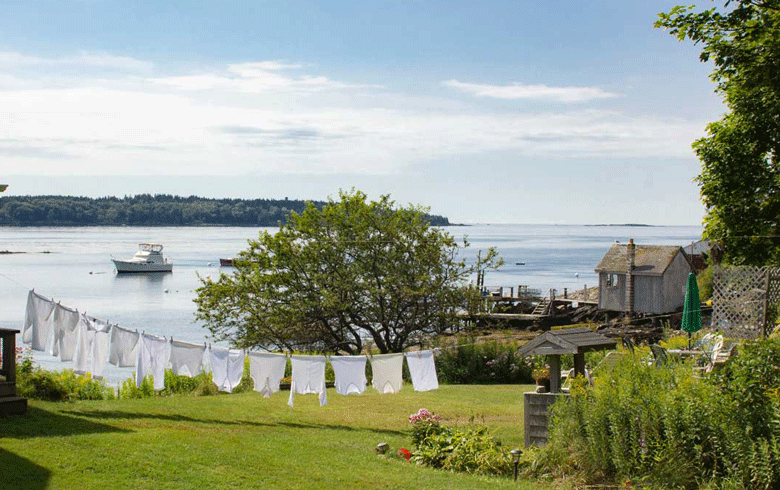Reflections is written by Island Fellows, recent college grads who do community service work on Maine islands and in coastal communities through the Island Institute, publisher of The Working Waterfront.
The coast of Maine is an iconic place. You say “Maine” to someone out of state, and they picture harbor-front shacks where boiled lobster and clams are sold, quaint little towns, and pine trees sprouting from a rocky shore.
Life as I have found it here is a mix of that idyllic shorefront setting and industries such as lobster fishing, which is subject to fluctuating harvests and changes in management.
Lobstering is a key industry for Maine, accounting for more than 80 percent of commercial fishing revenue for the state. Many coastal towns are reliant on the industry to maintain a healthy economy.
People can trust their neighbors to have the same goal in mind—to protect their communities and plan for their future.
Maine has not always adhered to the traditional economically focused narrative in fisheries management. Governments want to argue that to control fisheries, they must be reined in by traditional capitalistic systems. Lobster fishers in New England have challenged this narrative by managing through regional and local governance, with zone councils and regional regulations managing the allocation of the fish stock.
The focus on local and regional management in Maine fisheries is demonstrative of the larger importance of community to the lobster industry.
The Maine coast is an undoubtedly beautiful place to live, and it is a place that evokes a strong sense of identity in those who call it home. Those who harvest lobster relate to their industry in a deeply personal way.
One lobsterman told me that many of his colleagues will never give up their licenses, even after they stop fishing, because being a lobsterman is a part of their identity. Entire communities can be tied up in these identities as well.

Many coastal towns see economic activity that is dependent on lobstering, such as boatbuilding, bait sellers, lobster dealers and processors, and marine hardware stores. Lobster fishing is a day fishery that allows people to go to sea each morning and come home and be part of a community every evening. Through this, people connect with their communities and develop a distinct culture along the coast.
I have seen this deep connection to community in my fellowship on Long Island in Casco Bay. I have seen the dedication and loyalty to the island and to the community through my work with the Long Island Comprehensive Planning Committee. This citizen group has been working tirelessly for over a year on the island’s comprehensive plan.
The committee has done a vast amount of community engagement work, from a community survey in the summer of 2021 to a series of public forums held on specific issues relevant to the island. We regularly have community members attend and view our monthly committee meetings.
We have had people attend public forums and ask questions about the plan and participate in planning for the island’s future. Impressively, the community survey got a total of 348 responses, which is approximately 40 percent of the peak population of Long Island. People are connected with the island and its community, and there is a strong desire to be involved in planning for its future.
As industries such as lobstering face change, residents must be ready to adapt. People can trust their neighbors to have the same goal in mind—to protect their community and plan for their future.
Maine lobsters are not just a profit center for the state. They are a cultural icon, a food source, and an identity. People are willing to put in the work and keep the fishery alive even in the face of monumental change.
I have witnessed this firsthand through my work on the island. Already, the community has activated around the issues named as the top concerns in the survey. There is true dedication and commitment on the island to preserving the way of life and ensuring that future generations can enjoy it on the island, just as those who came before did.
Melanie Nash works with the town of Long Island helping develop a new comprehensive plan, among other projects. She grew up splitting her time between Connecticut and the Pemaquid peninsula. After graduating from Clark University in 2019 with a degree in human environmental geography, she earned a master’s degree in marine affairs at the University of Rhode Island.





